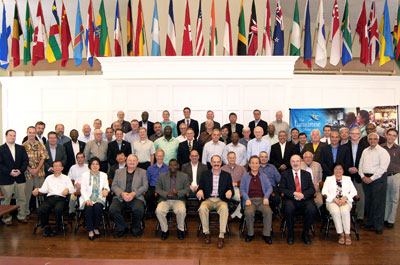Leaders Discuss Stronger Partnerships Between Western and Majority World Seminaries

BOSTON, 1 June 2012 – Global theological education is going through dynamic change. Sixty-three seminary presidents and senior academics from 31 nations gathered at Gordon-Conwell Theological Seminary (Boston, MA USA) 29 May to 1 June to examine current trends and determine new ways of working together. The Lausanne Consultation on Global Theological Education was held as a result of partnerships among leaders that were started at The Third Lausanne Congress on World Evangelization: Cape Town 2010.
The opening address was given by Dr. Tim Tennent (watch online), Chairman of The Lausanne Theology Working Group and President of Asbury Theological Seminary. “We face the twin challenges of the emergence of global Christianity and the collapse of Christendom,” he said. “We must retool Western faculties to bring in theology from the Majority World, so we are globally conversant.” A willingness by leaders to think beyond the norms of current theological education characterized the Consultation, as speakers from all continents of the world brought biblically-rooted, thoughtful reflection, raising sharp questions that were considered in roundtable discussions. Western seminaries and Bible colleges are deeply enriched by faculty who bring insights from the Majority World church, but the West should weigh this against the cost of depriving home nations of these fine teachers, according to leaders at the Consultation. “We love internationals on faculty, but we don’t often think of the benighted seminary losing people [for their seminaries],” said Dr. Chris Wright of Langham Partnership International/John Stott Ministries (USA).
Rev. S. Douglas Birdsall, Executive Chairman of The Lausanne Movement, articulated the Movement’s conviction that, “Theology and praxis cannot be separated; all theological reflection must find expression in mission activity, and all mission activity must be grounded in theological reflection.” To this end Dr. Darrell Bock, Dallas Theological Seminary, and Dr. Evvy Campbell, Wheaton College, worked with a global group of fifty-three scholars to compile annotated bibliographic resources (available at lausanne.org) to strengthen the teaching of the issues highlighted in The Cape Town Commitment at the seminary level.
Each morning of the Consultation began with an exposition of Scripture to frame the day’s discussion. Dr. David Sang-Bok Kim, Chairman of the World Evangelical Alliance, gave the Bible exposition on the last morning. From the Apostle Paul’s exhortation in Colossians 1, he urged character formation for theological educators themselves, as they invest in the lives of their students. “Faculty is the curriculum,” said Dr. Ashish Chrispal, Overseas Council Asia Regional Director.
This Consultation, the first of its kind, saw several expressions of practical and beneficial partnership among Western and Majority World seminaries. These included sharing library resources and appointing Majority World leaders as adjunct faculty rather than full time faculty, with the focus on stemming the “brain drain” from the Majority World, while also allowing the West to gain insights from the Majority World. Additionally, leaders were urged to understand that the West needs a new humility to receive help from the Majority World and that for the Majority World being good partners will take a new model of interdependence.
For effective and fruitful ministry in what Dr. Don Sweeting, President of Reformed Theological Seminary in Orlando, termed “the partnership century” leaders must, in the words of Dr. Mark Bailey, President of Dallas Theological Seminary, leave “logos and egos at the door.”
As the gathering closed, a Steering Group was formed to develop this new global network and to frame further conversations around the major issues which had been raised. A Lausanne Occasional Paper (LOP) from the Consultation is being developed by Dr. Mark Chan, Trinity Theological College, Singapore. This LOP will be published by Lausanne later this year.
BACKGROUND
Lausanne is a global Movement that mobilizes evangelical leaders to collaborate for world evangelization. It grew out of the 1974 International Congress on World Evangelization convened in Lausanne, Switzerland by Rev. Billy Graham and Bishop Jack Dain. The Third Lausanne Congress on World Evangelization (October 2010) in Cape Town, South Africa, brought together 4000 Christian leaders, representing 198 countries. The resulting Cape Town Commitment serves as the blueprint for the Movement’s activities.
The Lausanne Consultation on Global Theological Education is one of several global Consultations being convened this year by The Lausanne Movement. Others include the Lausanne Consultation on Islam, The Lausanne Consultation on Creation Care and the Gospel (Jamaica) and the Lausanne Consultation on Media and the Gospel (Norway). For more information, please go to lausanne.org.
# # #
For interviews or more information contact Naomi Frizzell, Lausanne Movement Chief Communications Officer, at media@lausanne.org or +1.904.262.5202.
